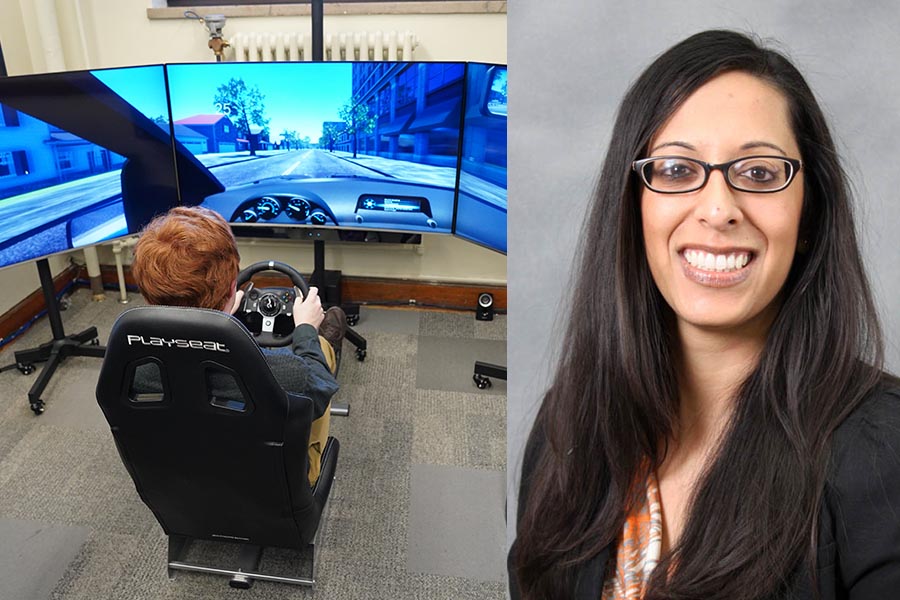Neera Jain receives NSF CAREER grant for cognitive state modeling for human-machine interaction

Jain, an assistant professor of mechanical engineering, studies dynamic modeling and controls. She has recently focused her attention on human-machine interaction, specifically as it relates to how machines can gauge human trust and other cognitive factors.
“There are many different types of cognitive factors studied by psychologists that affect these interactions between humans and autonomous systems,” said Jain. “Trust is one, but we also need to factor in self-confidence, mental workload, perceived risk, and others that affect human decision-making. There aren't too many models that understand how all of these factors interact with one another.”
When an airline pilot, for example, chooses to rely or not rely on autopilot, there are many cognitive factors that go into that decision. Right now, there are no formal methods for explicitly accounting for the human’s cognitive factors directly in algorithms that govern the operation of various types of autonomous systems. “Psychologists and human factors researchers are really good at describing these human cognitive factors,” said Jain, “but most engineers are more comfortable deriving mathematical models of systems that can be described by physical laws. There needs to be a mathematical bridge to quantify these factors, so that we controls engineers can integrate them into the decision-making algorithms that power vehicles and other machines.”
Given the interdisciplinary nature of her work, she’s enlisted the help of Robert Proctor, Distinguished Professor of Cognitive Psychology at Purdue, to help her design experiments. She’s chosen to focus on autonomous vehicles, because that’s an arena where people are most likely to interact with a machine that makes important decisions on their behalf. It’s also a high-stress environment where laboratory-like measurement systems are largely impossible. “In the past, we’ve measured brain waves and galvanic skin response to quantify some of the psychophysiological responses,” said Jain. “That’s tough to do in a moving car. It’s also not appropriate for the car to constantly be asking, ‘Do you trust me?’ So we have to learn how to leverage the data we can gather, to build a robust decision-making algorithm.”
In addition to using a driving simulator, she also plans on utilizing a unique piece of equipment: an autonomous tractor-trailer. Jain has worked with Greg Shaver on trucks that autonomously platoon for increased safety and fuel mileage. They can also provide a unique test bed to test her theories in the real world. “When you’re in a driving simulator, it’s tough to elicit real perceptions of risk, because the subject knows that nothing dangerous is going to happen,” said Jain. “But put an actual truck on actual roads, and we’re more likely to see the drivers experiencing the same emotions they would in real-life situations.”

Their trucks have been approved for Level 1 autonomy by the Indiana Department of Transportation, which is equivalent to adaptive cruise control for passenger cars. Jain is interested in seeing how professional truck drivers interact with the adaptive cruise control, and if her models and estimation algorithms will be able to correctly estimate the truck driver’s cognitive factors as they vary in real time. “We want to be able to gather data to determine if and when the driver’s perception of risk, workload, etc. change as they navigate the roadways," said Jain. "If we can do this successfully, it paves the way to ultimately design algorithms that can be responsive and adaptive to the human."
Another aspect of the NSF grant involves education and outreach. “The impact of technology on society is profound,” said Jain. “We need to teach engineers to focus not just on the technology, but also on policy and societal impacts of things like autonomous systems. That’s why I’m teaming up with Rosalee Clawson, a political science professor, to create a course that brings together students from the Colleges of Engineering and Liberal Arts to study these issues. Beyond that, I plan on taking students to Washington, D.C., to meet with policymakers, and make these issues real for the students.”
“I’m really excited about this project,” said Jain. “The work I’ve proposed builds on several years of prior efforts. I am now positioned to tackle fundamental challenges that need to be overcome to make some game-changing advances in this field.”
Writer: Jared Pike, jaredpike@purdue.edu, 765-496-0374
Source: Neera Jain, neerajain@purdue.edu, 765-496-0436
